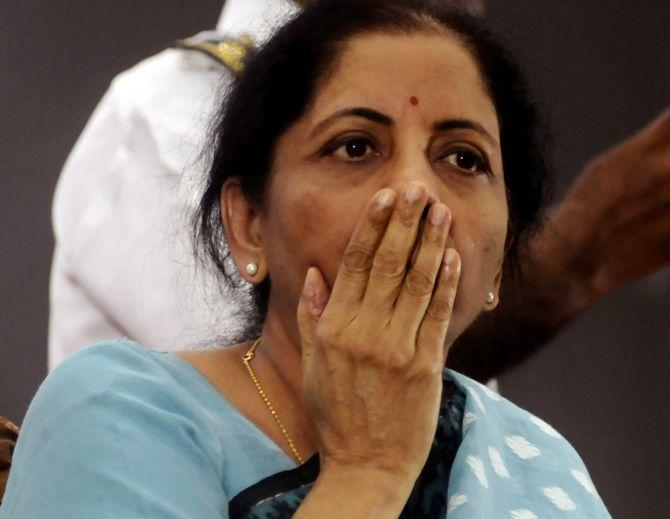 | « Back to article | Print this article |
The immediate revenue loss could worsen the Centre’s fiscal deficit, from the budgeted 3.3 per cent of gross domestic product (GDP) to 3.7 per cent of GDP -- a massive 40-basis-point increase. It was stabilised at 3.4 per cent since 2016-17, report Abhishek Waghmare and Dilasha Seth.

The big-ticket corporate tax relief announced by Finance Minister Nirmala Sitharaman is likely to severely derail the government’s fiscal consolidation plan, and reverse the fiscal balance achieved over the past three years.
Though the stimulus has the potential to boost investments in the medium term, the immediate revenue loss could worsen the Centre’s fiscal deficit, from the budgeted 3.3 per cent of gross domestic product (GDP) to 3.7 per cent of GDP -- a massive 40-basis-point increase. It was stabilised at 3.4 per cent since 2016-17.
An optimistic estimate of revenue shortfall of Rs 1 trillion in the income tax and the goods and services tax (GST) has been assumed in this calculation.
A further shortfall owing to slowdown could worsen the fiscal deficit situation further. In an unlikely scenario where the government manages to achieve budgeted revenue targets, the fiscal deficit would still reach 3.45 per cent of GDP, calculations show.
S&P Global termed this move a “credit-negative development”, Reuters reported after the announcement.
Public sector enterprises and government-owned banks may register stronger profits, and likely pass on higher-than-budgeted dividend to the Centre. Windfall non-tax revenue from the Reserve Bank of India has already provided a fiscal breather to the Centre.
A combination of higher dividends, financing public enterprises through off-budget borrowings, lower spending in certain schemes and cuts or saving in expenditure will help the Centre to reduce the quantum of fiscal slippage from the budgeted fiscal deficit target.
A low rate of fund outflow to big-ticket spending schemes such as PM-KISAN would also assist the government in containing the slippage.
“A relief of Rs 1.45 trillion will make the tax collection target realistic, bringing the required growth rate down to 5 per cent, which is the current run rate,” said a government official.
Direct tax collections have grown by just 5 per cent till mid-September this fiscal year, and would have required a perilous growth rate of 27 per cent for the remaining half of FY20 to achieve the target.
The tax department is of the view that in light of these announcements, it will be a challenge to even maintain a collection growth rate of 5 per cent this year and the Budget estimates are likely to undergo a serious revision at the RE (revised estimate) stage.
Though the loss in gross tax revenue would be Rs 1.45 trillion, the Centre’s net loss would be nearly Rs 84,000 crore, as 42 per cent of the loss would be borne by the states. Similarly, a shortfall of Rs 1 trillion in collection of direct tax and goods and services tax (GST) vis-a-vis the Budget estimate would dent the Centre’s finances by Rs 58,000 crore.
Taking into account the Rs 58,000-crore gain to the Centre’s kitty from the Reserve Bank of India (RBI), the overall fiscal loss to the Centre would be around Rs 84,000 crore. Assuming the nominal GDP to be Rs 209 trillion, this loss will raise the fiscal deficit by 40 basis points, or 0.4 per cent.
Experts and economists told Business Standard that turnaround in demand is key to accentuate investment and improve tax compliance. This is the reason the reformist move might not result in immediate improvement in direct tax collections this year. Real impact on collections will only be visible two-three years down the line, they said.
Former chief statistician of India Pronab Sen pointed out that the cut in corporation tax rate for existing companies to 22 per cent from 30 per cent was a pure supply-side measure, whereas the problem was in demand.
“As for existing companies, the will not help improve demand, and will lead to companies keeping a large chunk of the profit,” he said. However, he added that a huge tax concession to new companies was a more effective measure.
“You might see a lot of front-loading of investment in new companies,” he added.
Aditi Nayar, principal economist at ICRA. agreed. “In terms of investment revival, there is overcapacity in some sectors already, and we don’t expect a broad-based pickup in investments until there is greater visibility on stabilisation in demand,” she said.
States, on the other hand, stand on the brink of a fiscal crisis. While the enhanced RBI dividend will not accrue in state coffers (as it is a non-tax revenue), the revenue foregone because of corporation tax cuts would reduce the funds devolved from the Centre.
“With roughly 42 per cent of the central tax shortfall to be borne by the states through lower devolution, expenditure cuts at state level are likely to be required to avoid substantial fiscal slippage,” said Nayar.